Understanding the Mission, Terrain and Enemy
Maj. Gen. Abdul Khalifa Ibrahim, MNJTF Force Commander, Explains Why He Thinks the Lake Chad Basin Is on Course to Defeat Extremist Groups
Maj. Gen. Ibrahim of the Nigerian Army has a military career that spans more than 35 years. He holds a master’s degree in strategic studies from the University of Ibadan and has participated in international peace support operations in Liberia and Sudan. Domestically, he has led troops in operations in the Bakassi Peninsula, the Niger Delta and Kaduna. During his career he received honors including the Distinguished Service Star, Field Command Medal of Honour and Operation Lafiya Dole medal. In August 2021, he was named force commander of the Multinational Joint Task Force (MNJTF), a five-nation regional effort mandated to include up to 10,000 troops with the goal of restoring peace to the Lake Chad Basin. He spoke to ADF from the MNJTF headquarters in N’Djamena, Chad, in March 2023, shortly before the end of his time in command. This interview has been edited for space and clarity.
ADF: The MNJTF has a unique force structure with four sectors inside the national borders of the Lake Chad Basin (LCB) countries. Additionally, MNJTF brigades work with national militaries. How has this structure helped in the fight against violent extremist groups?
Ibrahim: Since each sector is domiciled within the country around the LCB, this gives us the advantage of keeping our eyes open and looking at the challenges within the areas. The LCB area is very big; the terrain is very challenging. We have massive water bodies. This allows Boko Haram, which doesn’t respect any boundary, to move from one country to the other. The fact that we are spread in the four sectors, across the four countries, has given us mobility, access, reach and allows cooperation amongst ourselves. This has helped us a lot in tackling the menace of violent extremist groups.
ADF: Do you think this could be a model for other regions of the continent facing insurgencies in border regions?
Ibrahim: Yes, indeed, the MNJTF is already a model for the continent and even beyond. We have people from the United Nations and other organizations coming to find out, “How are you operating?” The MNJTF is made up of three countries from the Economic Community of West African States –– Benin, Nigeria and Niger –– while Cameroon and Chad belong to the Economic Community of Central African States. Nigeria is English-speaking while Cameroon, Niger and Chad are French-speaking. And the Chadians also speak a lot of Arabic.
When you look at this mix, it could pose a challenge, but somehow we have been able to go through this by understanding our mission and understanding that the common enemy we have, the violent extremist groups –– you can call them Boko Haram, you can call them ISWAP [Islamic State West Africa Province] –– carry out operations in one country and run to another. With the concept of operations and the various programs that have been brought out in the MNJTF, we are more flexible. I am able to travel to Cameroon, to Niger, to parts of Chad where my force is domiciled, without any hindrance, so this has affected us positively.
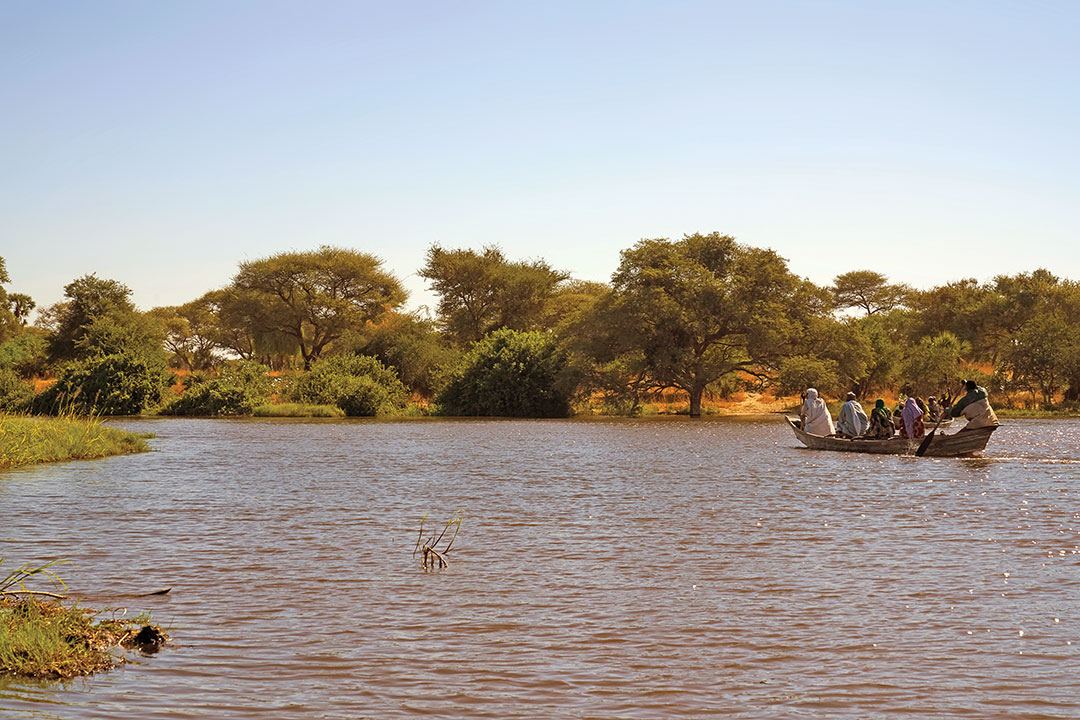
ADF: What are the latest developments in the region?
Ibrahim: In the last year, we have thousands of formerly internally displaced [IDP] persons returning to their ancestral homes. The political authority in Borno State closed the IDP camps, and they transported the people back to towns like Baga, Monguno, Cross Kauwa, and they are still there. In Cameroon in the last year, thousands of people have been moved from Minawao Refugee Camp. We also have opened the international route from N’Djamena, Chad, to Kousseri, Cameroon, on to Maiduguri, Nigeria. This road is open, and people can transport their commercial goods. The number of attacks has dropped significantly. People are able to return to the farms; people are able to engage in commercial activity. In Baga, people are fishing again. When you look at this you’ll see that gradually peace is returning to the LCB. More needs to be done, but we are on course.
ADF: One notable aspect of the MNJTF has been the use of air power. Can you describe how air power has supported ground-based counterinsurgency operations?
Ibrahim: In modern warfare, one of the dominant themes is the use of air power because it gives an additional reach, it allows delivery in places that ground troops can’t easily reach. Air power has been a force multiplier of immense proportion. The troop-contributing countries of the LCB area have invested so much, especially Nigeria, and the result is quite obvious. I’m not at liberty to go into details, but this improvement in the capabilities of the Nigerian Air Force, which we use as both a component of Operation Hadin Kai and the MNJTF, has indeed led to most of the successes that we have achieved. We have a lot of intelligence and information that comes out of the area, and we leverage this information by quickly informing our air component. They are able to quickly use the instruments they have, and a number of high-value targets have been destroyed. We have taken out a number of key Boko Haram and ISWAP leaders, their camps and their equipment, but it is underreported. Air power has been quite central to our success, and it will continue to be.
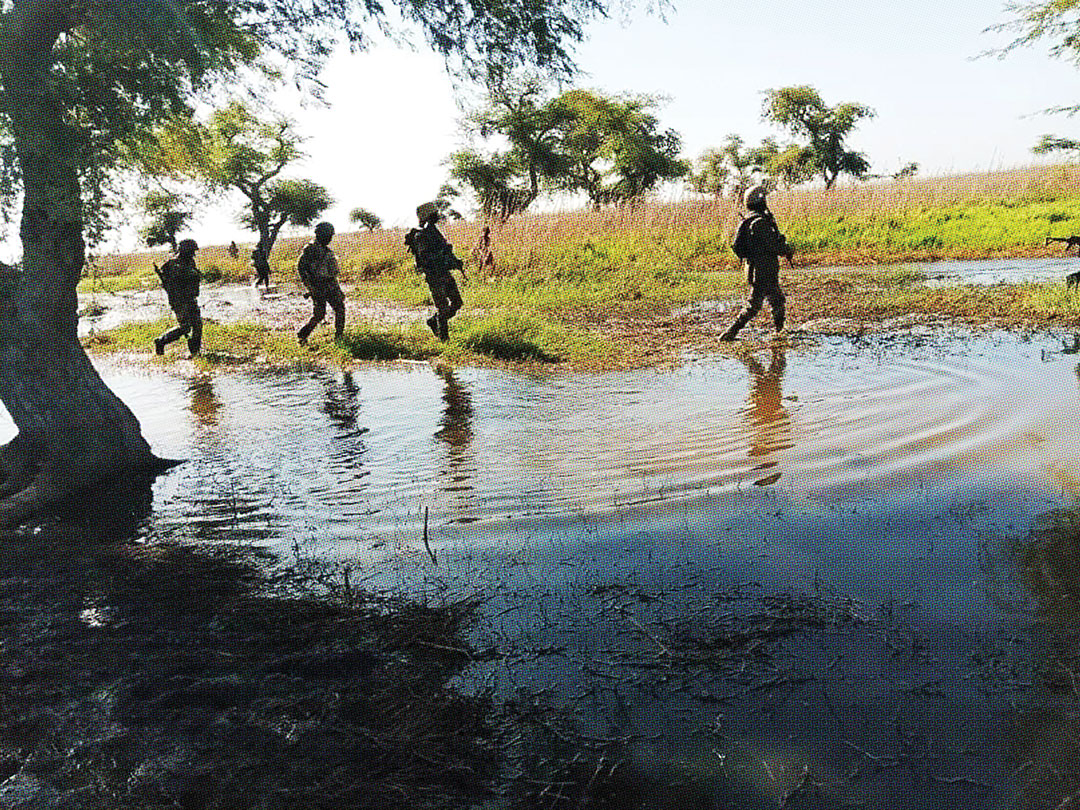
ADF: You have spoken about the need for a “whole-of-society” approach in the counterinsurgency environment. What does this mean to you, and how has the MNJTF sought to implement that approach?
Ibrahim: The whole-of-society approach basically is the employment of government, military, paramilitary, police, civil society organizations and the larger society toward preventing insurgency and mitigating its effects. This is done using kinetic and nonkinetic means. The kinetic means are the operations that we carry out, but we came to realize that the operations can, at best, tackle an insurgency at a rate of 20% to 30%. Seventy percent of the work that needs to be done must be nonkinetic. We have the civil-military cooperation desk, which is headed by a senior officer who acts on my directive. And we did not stop at that. We also have the civil-military cooperation desk in the Lake Chad Basin Commission, which is the supervisory headquarters of the MNJTF. These two cells come together, and then we find out from the populace, what are the things that we need to do to support these people? How do we build community resilience?
In the last year, we have carried out activities like the renovation of schools, renovation of hospitals and markets, so that the people will have a place to trade. Sometimes our Soldiers are attached to the schools. They teach. Our doctors sometimes offer treatment, along with our nurses. Basically, we believe to win a counterinsurgency operation is not just a military affair. All other sectors of society must contribute so we can have a better society for the benefit of all.
ADF: How has the MNJTF tried to encourage extremist group defections?
Ibrahim: Today, I can tell you confidently that within the MNJTF area of operations and our neighboring national operations –– Hadin Kai in Nigeria, Operation Emergence in Cameroon and others –– over 110,000 individuals have surrendered or defected. This number comprises fighters, their families, their collaborators and those that they forced to go with them. These are the results of the kinetic operations themselves. We put pressure on them, and they are not able to get the things they normally get to survive. But mostly it’s the nonkinetic aspect, which is psychological operations and strategic communications. We make use of international media outlets to talk to them, because we know when we talk in a certain way they listen. We tell them, “If your colleagues have surrendered, and they have not been killed, what are you doing in the bush?” This is not about religion.
There has also been intense infighting between Boko Haram and ISWAP that has resulted in even more coming out. What we do to encourage them to surrender is we treat them well. We don’t think that because they are coming out [that] they are enemies and shoot them. We respect the laws of armed conflict; we talk to them, and we appeal to them to talk to other people. We believe that the surrenders could potentially be a strategy to end the conflict. It reduces the population from where they can find fighters.
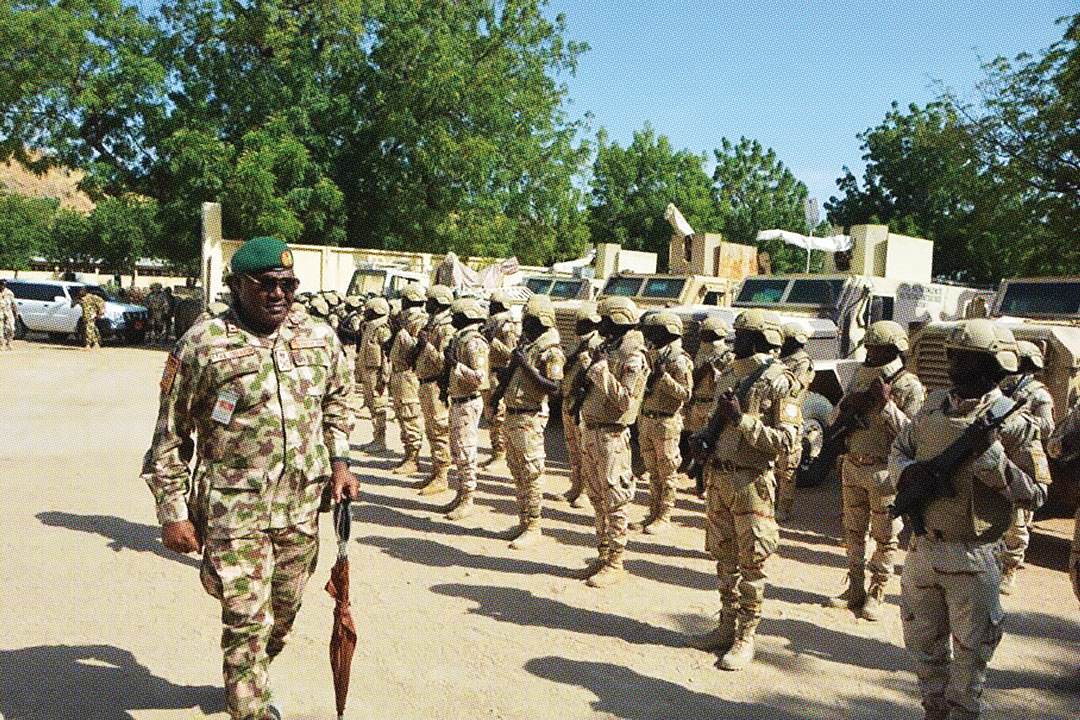
ADF: Insurgent groups thrive in places like the LCB with conditions of high youth unemployment, a difficult climate and a lack of infrastructure. What needs to be done to make sure the LCB is not a fertile ground for extremist recruitment in the future?
Ibrahim: The LCB area and islands historically have been challenging. The terrain is very difficult. It could be marshy, it could be swampy, it could be sandy. You have huge water bodies. Unfortunately, for a long time, the presence of governments has not been felt there. This is true across the four countries. That created conditions where the people felt deprived and fell easily to radicalization. I think there has to be a special focus on this area, something like the Marshall Plan that came after the Second World War. We have to look at that area and think about how to make it attractive to the people who live there. School facilities, hospitals, markets, even roads are not well developed there. I think we need to look at having infrastructure. But most important, it’s educating the people and giving them a sense of belonging.
ADF: How would you describe the current strength of the insurgent groups?
Ibrahim: The strength of Boko Haram and ISWAP has been degraded significantly, but we still have some way to go. This could be linked to the problem of the terrain. It is a very challenging environment. Sometimes you think of the area around Lake Chad as a desert, but it’s not so. It’s thickly forested. There are areas that are very difficult to reach. But we are working toward that. Last year we had Operation Lake Sanity where we were able to penetrate the Lake Chad islands. We deployed there for several months, and hundreds of hostages were released. Some escaped on their own and when we asked them how they got out, they said it was the effect of our bombing and offensive action that distracted the enemy, allowing them to escape. The next step is to study the lessons learned from that operation.
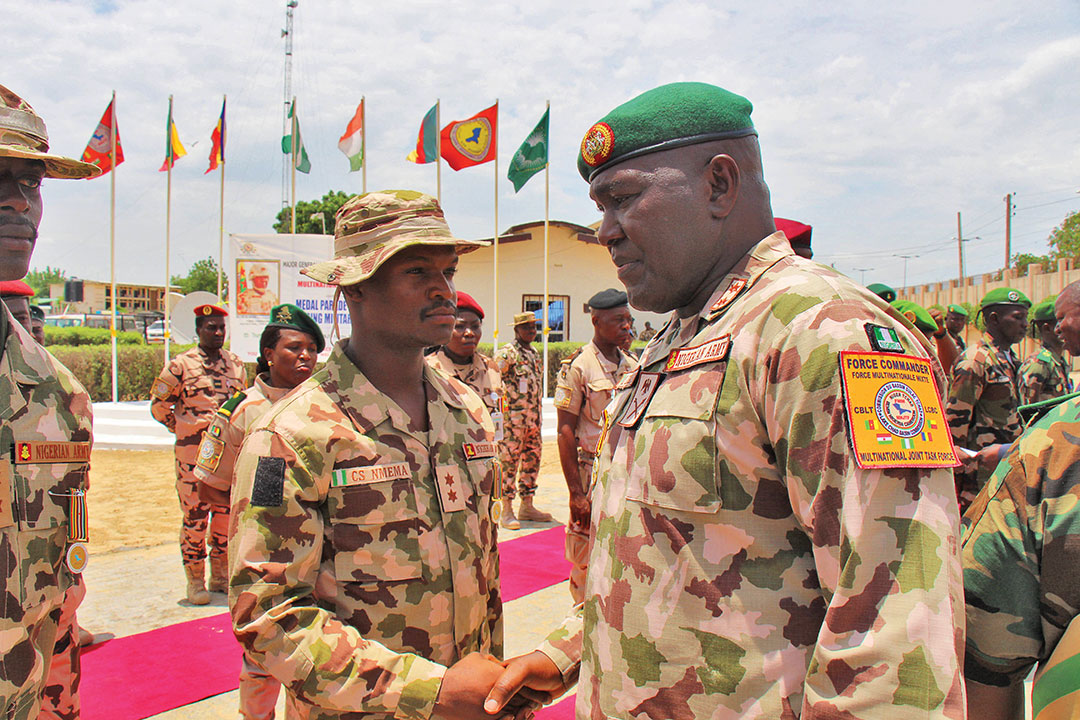
ADF: You took over as force commander in August 2021. What have you learned from the experience in terms of the strategy and resolve necessary to defeat an insurgency?
Ibrahim: This is a counterinsurgency operational outfit, which is different than a peace support operation. For it to succeed you must understand your mission very well. What are we there to do? Once you understand that, you have to understand the terrain. Then you must understand the nature of the enemy. The adversary we are fighting is a highly mobile, highly determined and fanatical foe. If you want to take them out, you must be top notch and very professional. You must treat your Soldiers the way they should be treated.
You must also have the right equipment. These people travel at night. They can move 50 to 80 kilometers in one night. You must have the equipment that shows you when people are traveling when they should not be and then you take them out. And then, of course, the whole-of-society approach that we’ve talked about is not mainly a military thing. We want the civil society to come in, we want the government and the local populace, because the insurgents live among them. We need them to be on our side.

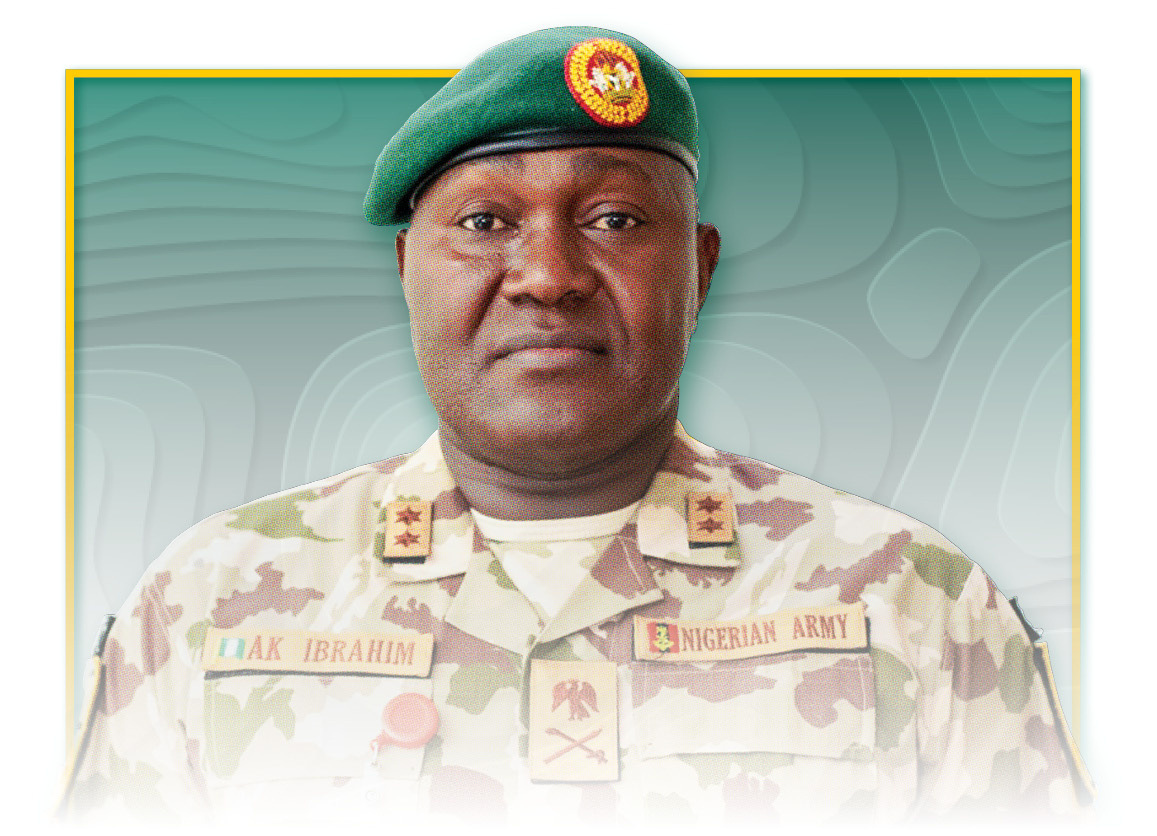
Comments are closed.